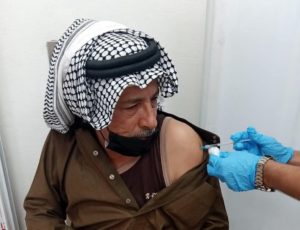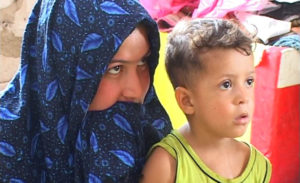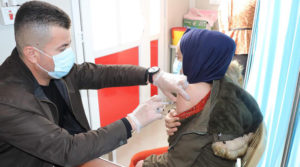Since the declaration of the Covid-19 pandemic in 2020, CREID has adapted its programme of work and responded to redress the increased impact of Covid-19 on religious minorities, who experience heightened vulnerability on account of their religion or belief intersecting with other identifiers and inequalities, including socioeconomic marginalisation and stigmatisation, resulting from campaigns of misinformation linked to the spread of the coronavirus.
Some of our initiatives include:
- provision of healthcare, essential services and personal protective equipment (PPE) for religious minorities
- challenging narratives around minorities and the spread of Covid-19 and countering hate speech,
- highlighting how Covid-19 has exacerbated pre-existing religious inequalities through high-level communications engagements, blogs and research.
Programmatic implementation: Our response to the pandemic
Where coronavirus has increased the vulnerability of poor religious minority communities to stigmatisation, economic exclusion and marginalisation, IDS with partners has been exploring over the past year how small-scale development interventions can ease their predicament.
Iraq
- Between April and June 2020, MRG local partner IMOK (Independent Media Organisation in Kurdistan) developed public health awareness guidelines to dispel circulating misinformation around Covid-19. These guidelines were developed in English, Arabic and Kurdish.
- Hate speech monitoring work has also continued, challenging stigmatising narratives which have apportioned blame to religious minorities for spreading Covid-19. Local partner KirkukNow has reported on the situations of Iraqi minorities ignored by the mainstream media, including Armenians, Christians, Kakais, Shabaks and Yezidis. Work on the Kakais has recently been published as part of the collection, ‘Kakais in the Time of Corona’, published in Arabic and English. This booklet will inform engagement with the Iraqi parliament, relevant ministries, non-governmental organisations and rights groups.
- KirkukNow’s work to report on the enhanced challenges that minorities in the Ninevah Plains and other disputed areas of Iraq have faced due to the pandemic has helped to secure increased funding for essential food and medical supplies for IDP camps, raised the profile of minorities among local government officials, secured free healthcare from a hospital in Erbil for a struggling Kakai family, and helped to improve the mobility of Yazidis unable to work due to travel restrictions.
Pakistan
- Al-Khoei local partner Hive, as part of the Ravadar project, have completed work on the water filtration plan in Joseph Colony. This Christian-majority settlement suffered from extreme water access issues following an arson attack in 2013 due to blasphemy allegations. During a feasibility assessment following the outbreak of Covid-19, water was highlighted by community members as a crucial need impacting their health, security and wellbeing. The completed water filtration plant will provide clean and safe water to 5,000 people in the neighbourhood, and management of the plant is now overseen by trained local community members. Hand washing and sanitation facilities for residents of Joseph Colony are also being established.
- Ravadar has further directly adapted its programming in response to Covid-19 through a cleaning drive and awareness raising around Covid-19 protection in Youhanabad. A community committee is being established to improve local sanitation facilities and lobby municipal management to remove rubbish, while providing information to residents on how best to protect themselves from Covid-19.
- MRG have also adapted work to seek to support marginalised (primarily Christian and Hindu) sanitation workers as a group highly vulnerable to Covid-19. Local partner the Centre for Law and Justice (CLJ) have distributed PPE to 220 sanitation workers across five locations in Lahore (Youhanabad, Bail Ahata, Mayo Hospital, United Christian Hospital and Expo Quarantine Centre). The distributed safety kits included gloves, masks, goggles, sanitiser and disinfectant. CLJ also conducted 20 hygiene and sanitation awareness-raising sessions in the informal settlements where sanitation workers live in an effort to increase their protection against Covid-19 and to raise awareness of precautionary measures.
- The CLJ have also launched an advocacy campaign, Sweepers Are Superheroes, expected to reach at least 100,000 people, which seeks to raise awareness of the conditions facing sanitation workers in Pakistan. The campaign challenges the stigma faced by these marginalised minority workers, promoting their dignity, inclusion, economic wellbeing and protection, particularly in the context of Covid-19, given many sanitation workers have been forced to work on Covid-19 wards without any PPE provision or even renumeration. The campaign will be used as part of an online and offline advocacy initiative, supporting at least five meetings with local government officials and leading to the development of 20 targeted advocacy messages.
Egypt
- Where health services are under extreme strain due to Covid-19, resulting in the religiously marginalised poor falling in-between the cracks of healthcare provision, CREID has adapted its work in Egypt, through local Coptic diocese partners (based in Kayloubia, Zakazik, Minia el Kameh and Qus) to support mobile health clinics responding to the needs of people living in poor areas who are unable to access essential medical services. This has included the supply of equipment, providing badly needed oxygen tanks for senior citizens living in some of the poorest villages, as well as the provision of health kits and Covid-19 tests. The project has also supported awareness raising of Covid-19 preventative measures and offers psychosocial support to affected patients and their families within the vulnerable communities.
- To serve coronavirus patients, CREID is supporting the local Coptic dioceses to provide mobile clinic teams with PPE (including masks, shields, gloves and hand sanitiser) and medical supplies (including healthcare kits, oxygen cylinders and generators, cannulas, syringes, pulse oximeters, thermometers, venturi, nebulizer masks and alcohol) in addition to essential medicines (including paracetamol, antibiotics and vitamins). This supports the clinic teams to safely continue their essential works, allowing many patients to recover at home.
- Through this work, the mobile clinics are having a direct impact on poor marginalised communities in Egypt, addressing their immediate healthcare needs and reducing the burden on local hospitals. Diocese partners also work to negotiate reduced prices with laboratories and radiology centres for any further necessary testing, and in Kaylouibya and Nakada livelihood support is also extended to the most vulnerable families.
India and Nigeria
- The project Understanding intersecting vulnerabilities experienced by religious minorities living in poverty in the shadows of Covid-19, part funded by CREID and the FCDO’s Human Rights and Democracy Department, in implementation since January 2021, seeks to capture through participatory research the impact of Covid-19 on the religiously marginalised poor in India and Nigeria, in order to inform locally-sensitive policymaking and adaptations for ‘building back better’ for these minority groups.
- 10 workshops have been completed with female, male and comparator groups and semi-structured interviews have been carried out with participants in Plateau and Kaduna States in Nigeria.
- Five workshops have taken place with female and male minority groups, plus a comparator group, in Bangalore, India, with research currently underway in slums in Chennai (which has been delayed due to challenges around Covid-19 local government restrictions). Semi-structured interviews have also been undertaken.
- This data will be interpreted through the delivery of local reports next week, collective analysis and validation workshops, and the production of a final report and policy briefs with practical recommendations later this month.
Download our report ‘Understanding Intersecting Vulnerabilities Experienced by Religious Minorities Living in Poverty in the Shadows of Covid-19‘
International
- CREID launched its ‘Religious inequalities and the impact of Covid-19 series’ in May 2020 which includes over 60 publications to date highlighting how the pandemic is increasing hardship for the poorest and most marginalised religious minorities globally. Coverage so far has focused on the situation of minorities in India, Iraq, Uganda and Pakistan. The series has seen a broad uptake and engagement, with K4D’s recent helpdesk report, ‘Covid-19 and rights of members of belief minorities’, published in November 2020, drawing extensively on CREID’s research, which is also cited in the UN Special Rapporteur on FoRB’s recent report to the UN Assembly in October 2020, and in the ‘Commentary on the Current State of International Freedom of Religion or Belief’ released by the UK APPG for International FoRB in February 2021.
- In June 2020, CREID held a virtual stakeholder event, ‘How can we address religious inequalities in a post-Covid-19 transition?’, to discuss the implications of Covid-19 on religious minorities around the world. Speakers included partners from Iraq, Nigeria and Pakistan, as well as the then UK Special Envoy for Freedom of Religion or Belief, Rehman Chishti. The event enjoyed a broad cross-sector engagement and was attended by over 90 people.
- CREID local partners from Hive and KirkukNow further represented CREID’s work addressing the impact of Covid on religious minorities at the webinar ‘Implication of Covid-19 on religious minorities in specific contexts’.
- Jaffer Abbas Mirza from Al-Khoei Foundation presented lessons learned from CREID at a webinar in August 2020 attended by over 100 people entitled ‘Covid-19 and South Asia: Citizenship Matters?’
- Mariz Tadros from IDS presented at a British Council webinar on development strategies for heritage protection post-Covid-19.
- CREID local partner IMOK supported an event, ‘International summit on domestic family violence during the C-19 era’ in November 2020 where speakers highlighted the connection between Covid-19 and an increase in hate speech against minorities.



